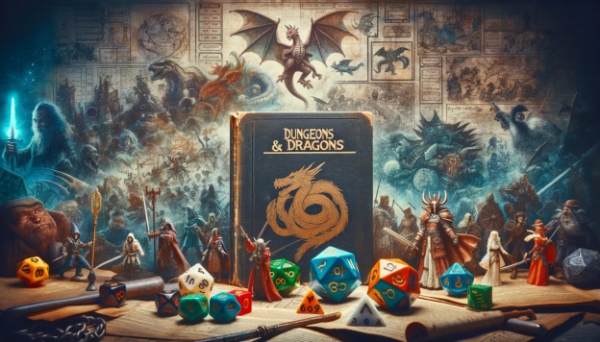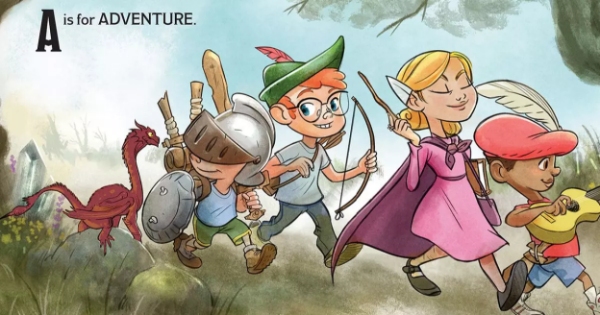Dungeons & Dragons aka D&D is currently one of the most relaxing tabletop role-playing games for kids. The game features both adult and kids versions with the dnd for kids offering a number of kids tailored gaming benefits such as enhancing creativity, problem-solving abilities and also instilling teamwork skills. Besides collaborative storytelling, children learn how to build their confidence and useful social skills as they create their own narratives. This highly flexible game is ideal for various age groups as it fosters a great sense of shared excitement and community belongings. As more educational and family programs continue to recognize the importance of this game, D&D’s popularity is growing among the younger generation thus making it a valuable tool for both learning and fun.
Overview of D&D
In the game, one player takes the role of a storyteller and a referee while the other person controls the heroes. The game being a tabletop role-playing game means that friends need to create characters before they can embrace the epic adventures altogether. So, why is playing dnd for kids such a big win for young players? Keep reading to learn more about this game and how to keep your kids safe while in the game.



What is the youngest age to play D&D?
Different D&D games target different players based on their age. While some games have the minimum age recommendation start from 4 years, others recommended 12+ children on their gameplay.
Is there a kid version of D&D?
Certainly yes. There is a kid-friendly version of Dungeons & Dragons that makes the gaming rules much easier for young players to access them. Here are some of the notable options and the main differences from the normal D&D.
D&D Starter Set
Age 12 + Kids below this age may require adult guidance.
The main difference from the normal game is that it includes pre-made characters and simple rules to help kids fare well with the game without feeling frustrated.
The adventure is also straightforward and a shorter rulebook. It thus becomes much easier to understand its gameplay when you compare it with the full Player Handbook.
Hero Kids
Age. 4-10 years.
The major difference from the starter game is that it has a simple rule guide thus making it easier for young players to understand and play. It also includes a six-sided dice instead of the various dice used in the standard D&D. The primary focus is on storytelling and adventure rather than the normal complex game mechanics.
No Thank You, Evil!
Age 5+.
One of the most child-friendly games ever created by Monte Cook Games. In fact, this is what makes this game to be different from the normal D&D game. The game’s system and characters are simple to understand by children, a straightforward creation which encourages creativity and storytelling. The good news is that it’s also tailored for players with different preferences.
D&D Essentials Kit
Age 12+. Younger players can adapt.
What makes this dnd for kids different from the normal game is that its rules enables players to create characters thus helping add a bit more complex gameplay as the kid advanced with the game. It also features some more detailed adventure thus it is ideal for new players in the game.
Amazing Tales
Kids 4-8 years.
The game is more simplified with plenty of imaginative and quick play sessions. It also includes a single-six-sided die with its primary focus on storytelling and collaborative creation.
Protect children from cyberbullying and scams by monitoring playtime and purchases.
Is Dungeon and Dragon safe for kids
Sure! Playing Dungeon and Dragon comes with many benefits for kids, especially helping their creative, imaginative and social skills. However, the game’s appropriateness also depends on other factors such as the child’s age, game’s content and the parental guidance from parents or guardians.
Let’s discuss the pros and cons of playing dnd for kids.
Pros:
– D&D for kids help improve imaginative and creativity in kids. Kids who play dnd for kids can think creatively as the game encourages a lot of storytelling and imaginative play. Kids are free to develop backstories, contribute to the primary game narrative and even create their own characters.
– Develop social skills. The game enables players to promote teamwork, cooperation and communication. Players need to work on various projects together in order to solve hard problems and achieve common goals in the game.
– Critical thinking and problem solving. D&D game calls for players to use a lot of strategic thinking , planning and even use their problem solving abilities. For instance, players are required to weigh critical options, think critically and think how to carry out various actions otherwise face consequences.
– Sharpen math skills. Reading, writing and calculating is not an option in dnd for kids . The game’s success depends on how the player becomes so kids can learn how to read character sheets, calculate dice rolls and even how to manage scarce resources.
– Emotional Development. Children who play D&D can learn how to develop empathy and emotional intelligence as they go through different scenarios and characters.
Cons of D&D for Kids:
- Game complexity. There are game versions that are too complex or even challenging for kids to enjoy without parental guidance.
- Time commitment. Some game sessions require lengthy hours to complete compared to regular game time commitment.
Getting started with D&D for kids
Age-appropriate content
What do you consider when choosing the right Dungeons & Dragons for kids? Basically, when introducing children to D&D, it’s important for parents to select a version or edition that matches their specific age and their comprehension level. Here are things to consider.
Choosing the right edition:
Get the best game edition. Before you can introduce your kids to D&D, it’s important to select an edition that is age-appropriate and ideal for their comprehension level. Choose games like.
D&D Starter set. This is one of the best options to introduce your kids to different age groups. The game includes beginner-friendly adventures, pre-made characters and streamlined rulebooks. The simplified rules and structured gameplay further makes it easier for kids to understand its basics much easier.
D&D Essentials Kit. The essential kit offers a bit of flexibility when it comes to character creation while still keeping the game rules much accessible. Besides, it also offers detailed tools and adventure for winning its gameplay even to young learning kids.
Simplified versions. Using simplified versions or homebrew rules targeting kids means creating an enjoyable gaming environment for them. Indeed, some dnd for kids have already incorporated kid-friendly, focused, imagination sessions over complex mechanics.
Parental guidance:
It’s your responsibility as a parent to ensure that the content and the gameplay of the game your kids access is appropriate .
Review materials. Before your kids can start participating in a game, it’s important you ensure to review the rulebooks, adventures and other additional materials to ensure that such material meets the child’s maturity levels and age.
Supervise Gameplay. This is particularly for younger children who need parental supervision during the gameplay to help and intervene where there’s an issue.
Encourage positive play. Let your kids focus on teamwork, creativity and problem-solving skills while playing the game.
Basic rules overview
At its heart, D&D is a storytelling and an imagination game. Here are basic mechanics to start the game.



Core mechanics:
Rolling Dice. The game features a polyhedral dice d20 i.e 20-sided die being the major item on the game.Players roll dice to come up with outcomes of actions such as saving throws, attacking and still checks.
Character creation. Players can create characters by choosing which race they want i.e dwarf, elf, class e.g wizard, fighter and their background. Players can assign values to the various player attributes such as dexterity, strength and intelligence which affect players playing abilities.
Storytelling. One player assumes the role of Dungeon Master(DM), who describes the world and guides the story. The other player goes on to describe the actions of their characters and come to make decisions influencing each narrative.
Simplified rules:
Simplified rules. For younger players, it’s important to simplify rules that make the game more enjoyable and accessible.
Streamline character creation. Make sure you provide limited options and pre-made characters to avoid overwhelming choices.
Narrative focus. Always emphasize on failure systems or simplified systems rather than complex modifiers.
Adjust combat. Keep combat encounters straightforward or short. Use simpler tactics and fewer monsters to maintain engagements and avoid frustrations.
Reward Creativity. Ensure rules are flexible to reward imaginative play and creative solutions.
Increase your child’s understanding of D&D games while ensuring their safety
Now that we’re aware about the various rules and materials of D&D games, it would help if we learn more about it on Communities and Online Resources, forums, websites and social media groups. However, the only challenge about this route is when our children get exposed to unknown online communities and resources. This can worry you as a parent since tech savvy kids may end up searching and coming across some unhealthy online information. Fortunately, this is where the FlashGet Kids app comes in.
FlashGet Kids app Screen Mirroring feature. This feature enables you to display the current content on your kids own device thus capturing the content they’re accessing in real time.
Remote camera. Through the FlashGet Remote camera, you can monitor your kids’ environment using their phone’s front or back camera. Once you activate the camera on the child’s phone, you can view their surroundings, track the devices and environment in real time as they play dnd for kids.



One-Way-Audio. This feature enables you to actively track the surrounding environment of where your kids are thus knowing their circumstances. By recording the environment sound around your kid as they play dnd for kids, you can tell if the kid is safe and the child is not bullied while in the game.
Conclusion
Dungeons & Dragons is certainly a valuable and interesting game for children especially for fostering critical thinking, creativity and teamwork. When you ensure proper supervision and the appropriate content, kids can have a positive experience while playing the game.Besides, for a comprehensive control and peace of mind, you may consider using FlashGet Kids parental control app to control what happens on your kids device. This top-rated parental control app offers extensive monitoring features and user-friendly interface to help you create a safe online environment.

